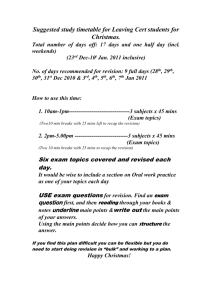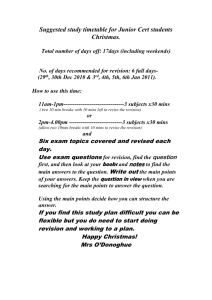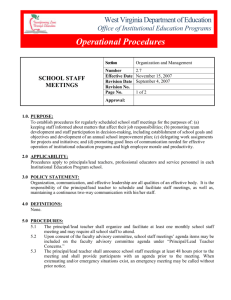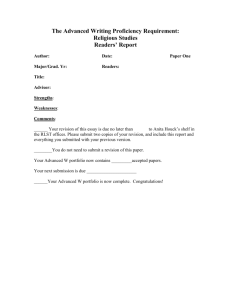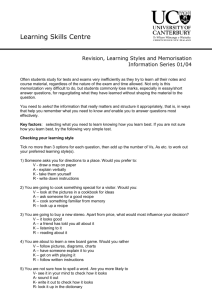Year 11 Effective Learning and Revision Booklet
advertisement
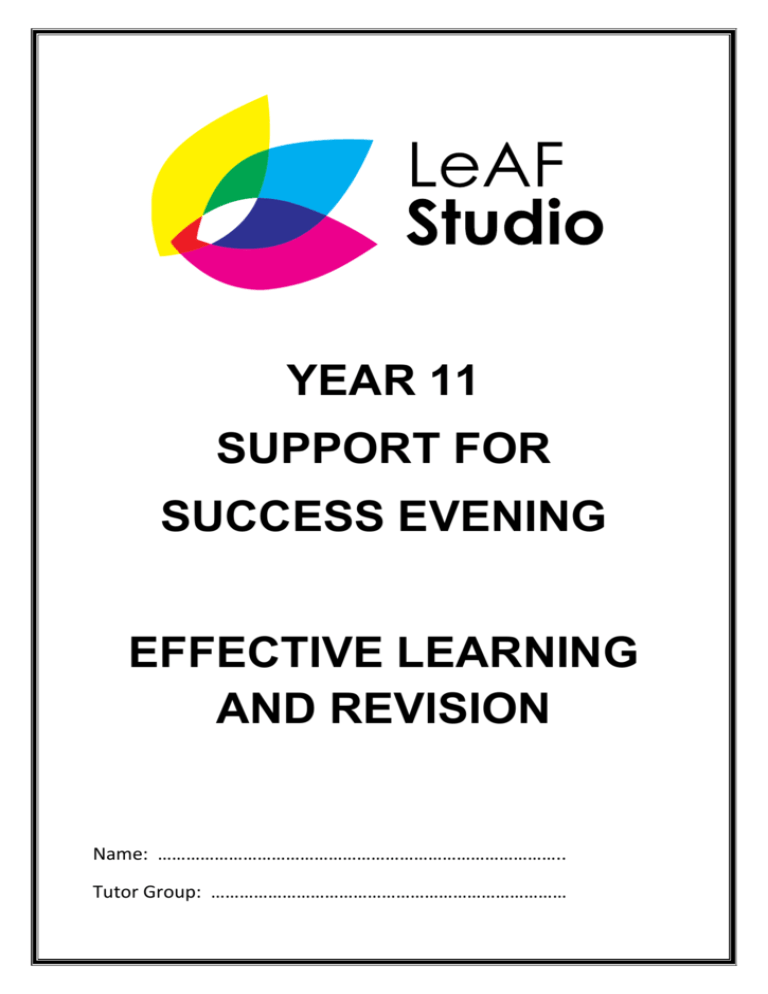
YEAR 11 SUPPORT FOR SUCCESS EVENING EFFECTIVE LEARNING AND REVISION Name: ………………………………………………………………………….. Tutor Group: ………………………………………………………………… Set up your Planner and set yourself Targets Complete the Activities you have set yourself Review and Evaluate it every Half Term Set yourself New Targets for the Holidays and the Beginning of each Half Term after Progress Complete a Comprehensive Revision Plan from January onwards Reach Your Full Potential! The following shows how you might improve your learning and revision techniques. It includes: A Termly Achievement Planner A Holiday Achievement Planner A Revision Achievement Planner for use nearer to your exams which includes an extra revision activity and target. Planners Ensure that your planner reflects that you PLAN your work carefully and stick to your plans Set yourself challenging yet realistic targets and check on your progress Place on them any intervention/revision sessions Always add other activities/commitments you have so you are able to plan your work deadlines and revision more easily Always fully understand your work before trying to complete set tasks or revise – ask your teacher for assistance if unsure/attend intervention classes Don’t put yourself under unnecessary pressure! Please remember proper revision cannot be done in just the few nights directly before the exams! It is something that you should constantly be doing in some way. As you approach your exams make sure that you: Plan carefully. Well in advance Talk about your work to your Teachers and Personal Tutors Work through essays, notes and past papers Keep to a schedule This will work much better than any last minute panic! Achievement/Holiday/Revision Planners Use the planners to improve your work/life balance. Ensure that you are spending quality time on your home learning, alongside activities and/or other commitments that you regularly participate in. There are three different planners; one to use now, one to use in the holidays and one to use nearer to your examinations. Extra copies can be accessed and downloaded from the website or from your Personal Tutor. Revision Planner This has a slightly different content from the Holiday and Achievement Planner. Make sure you write on your exam dates when you receive them. Perhaps you can colour code each subject so it is easier to plan your revision. Your schedule over the February Half Term, at weekends and Easter holiday will make a big difference to your stress levels before the exams. Use the Easter break to its full advantage and remember to revise consistently throughout in all subjects. Half Termly Achievement Planner Mon Tues Weds Thurs Fri Sat Sun Date/Week beginning: Before School: After School Activity/ Intervention/ Revision Class Revision activity 1 and target (45 mins) Revision Activity 1. Revision activity 2 and target (45 mins) 3. Revision activity 3 and target (45 mins) 4. Revision activity 4 and target (45 mins) Social time/ other commitments 2. Revision Achievement Planner Mon Tues Weds Thurs Fri Sat Sun Date: Exam am: Exam pm: Before school: Lunch activity or revision session Revision Activity 1 After school intervention/ revision/sport 2 Revision activity 1 and target (45 mins) 3 Revision activity 2 and target (45 mins) 4 Revision activity 3 and target (45 mins) 5 Revision activity 4 and target (45 mins) 6 Revision activity 5 and target (45 mins) 7 Social time/other commitments Holiday Achievement Planner February Half Term Mon Date: Week beginning: Revision activity 1 and target (45 mins) Revision activity 2 and target (45 mins) Revision activity 3 and target (45 mins) Revision activity 4 and target (45 mins) Revision activity 5 and target (45 mins) Social time/ other commitments Tues Weds Thurs Fri Sat Sun Holiday Achievement Planner Easter Holiday – Week 1 Mon Date: Week beginning: Revision activity 1 and target (45 mins) Revision activity 2 and target (45 mins) Revision activity 3 and target (45 mins) Revision activity 4 and target (45 mins) Revision activity 5 and target (45 mins) Social time/ other commitments Tues Weds Thurs Fri Sat Sun Holiday Achievement Planner Easter Holiday – Week 2 Mon Date: Week beginning: Revision activity 1 and target (45 mins) Revision activity 2 and target (45 mins) Revision activity 3 and target (45 mins) Revision activity 4 and target (45 mins) Revision activity 5 and target (45 mins) Social time/ other commitments Tues Weds Thurs Fri Sat Sun Evaluate your current academic performance! Subject Target Grade What do I need to do to reach my target grade and beyond? What are my current strengths, weaknesses and areas to improve? How can I be successful in all areas of my work? Rewards Don’t forget to allow yourself some you time. Break up your home learning/ assessments and revision sessions and plan some rewards to look forward to; fruit, chocolate, a drink, ten minutes in the garden, glancing at a magazine, going for a walk… whatever will motivate you! Remember, breaking up your work time gives you more stops and starts and more stops and starts increase your learning. Relaxation is important to help you stop feeling the pressure of deadlines, tests and examinations. Find a simple technique that works for you and practise using it when you are stressed or can’t sleep. Have you tried: A warm bath Visualising yourself passing the test Brain gym exercises Stroking a pet Deep breathing Going for a walk Asking someone to give you a head massage Yoga Losing yourself in some soft music Feed your brain! Fresh fruit, water, fish and vegetables give you brain power! Prioritise Ensure you meet deadlines. Work towards these, don’t leave it to the last minute. Attend intervention sessions if necessary. Exams seem a long time away, but you can begin to revise topics already. Your mocks begin on 16th November 2015. Don’t leave anything to the last minute; be effective with your time management. Concentrate on improving in subjects you find more challenging. Attend intervention classes/revision classes after school. Ask your teachers for support with assessments and coursework Assistance There are lots of people who want to help you throughout Year 11. Take full advantage of them by letting them know when you are worried or concerned. You know the people who can help you out, your personal tutor, subject teacher and your parents/carers. Make sure you get in touch if you have any problems. A little now, goes a long way later! Revision Techniques/Notes and Good Practice Preparation Revision helps learning Revision increases your achievement in tests/mocks/final exams Achievement in exams gives you wider choices later on Achievement will make everyone proud of you You will feel great! Where? The ideal study room is light, airy, quiet with shelves and a desk. Some people are lucky enough to have this and enjoy working in it. Don’t worry if you haven’t got this. You can still try to get some of the elements. Vary your revision place. It’s a good idea to put up posters, lists and post-it notes in other places in the house. Some students find they revise well with friends and it is a good idea to do this sometimes as a bit of variety and fun. Ban the television and all social media. They are too distracting, so make sure they are turned off when you are working. Remember to keep a space in your revision planner for your favourite programmes. Lots of students find that some background music helps the revision process. Avoid music with lyrics as you are likely to concentrate on these rather than your work! How? Check your notes are complete. If they are not, you have several sources from which to find out missing information; text books, teachers, other students and revision sites on the internet. Check your understanding by discussing work with friends or teachers. The important thing with making these is that you change the format of your original notes. The very act of changing the information into another format means that your brain is processing the information, which means that it is much more likely to stick. You may have to try out various formats to find one that suits you personally. If you like colours and diagrams more than words, try a mind map, or colourful flash cards. If you like lists of words, try reducing your notes to the bare essential words in bullet points. If you have a strong auditory preference, try recording the main points onto a tape or use the record facility on your computer for play back. One of the advantages of a mind map is that you will be able to see the whole topic and get a feel for how each part fits together. Make diagrams Labelled drawings Mind maps Charts and flowcharts (for processes) Summarise your notes. Convert them into condensed packets of information. These can be in the form of: Index/flash cards Bullet pointed concise lists (you could do this as a PowerPoint if you like using the computer. Then simply run through your presentation. Give it to anyone who will listen, it is not important who, but explaining it out loud is. It just sounds better than talking to yourself, but you can do that too!) Mind maps Recording the essential information onto tape/computer Exams Additional information concerning all exams can be found on the Academy web-site under EXAMS. The examination timetable for the summer 2016 exams will be published next year, as will information about when personal timetables and statements of entry are issued. It is important that you and your child check any entries to ensure they are correct, both for the subjects and the tier of entry. Year 11 Mock Examinations take place the week beginning November 16th 2015. This will be an important time for all Year 11 students, and will require planned revision for all subjects. Final Preparation Exam techniques and preparation When you are sitting your exams you are going to feel nervous (to a greater or lesser degree). This is normal. Use that nervous energy to help you. Don’t let it panic you. Read the instructions and descriptions (rubric) at the front of the exam. Make sure you know which sections to read and which questions to answer. It will tell you how long you have and how many marks there are for that paper. Follow the instructions carefully. The examiners are on your side, they are trying to find ways to give you the marks. They are not trying to take away marks for you. If you make it like hunting for a needle in a haystack, it is very difficult for the examiners to find anything worth giving a mark to. One of the most common mistakes is that people don’t read the question properly and answer the question they think they read, or wanted to read, not the actual question. As good as the answer may be, if it’s not the one to the question, it won’t get any marks. Address the question showing understanding and detailed explanation. You must demonstrate clear thinking and understanding of the topic. A muddled answer is hard to award marks to. Plan your answer, even if it is jotting down all the key words that you associate with that question, numbering them, and then using them to construct a full explanation. It may help to underline or circle the questioning word (how, why, what, explain, compare, contrast, describe, outline etc.) Also highlight the key words or concepts mentioned in the question. Doing this gives you a breathing space if you need it, and helps to clarify your thoughts and ideas, so that you can communicate them clearly. You may not know this, but if you cross out a correct answer and don’t replace it with a wrong answer, the examiner can give you credit for it even though it’s crossed out. However, if you obliterate the crossed out answer, it can’t happen. Use a single line to cross out so it can still be read, just in case! In an exam everyone’s writing gets more untidy than it would be normally. However, it must be legible. If the examiner can’t read it, it doesn’t matter how good the answer is. If you know this is a problem for you practice writing out answers. Get someone else to read them to check that it is legible. Helpful websites www.bitesize.co.uk www.sparknotes.com www.s-cool.co.uk www.examtime.com/en/users/sign_up revisionworld.com www.getrevising.co.uk www.studymaths.co.uk www.englishbiz.co.uk www.gcserevision101.wordpress.com www.gcse.com www.revisionapp.co.uk www.educationquizzes.com www.passmyexams.co.uk www.revisionworld.com/gcse-revision Exam Board Websites for Past Papers www.aqa.org.uk www.edexcel.com www.ocr.org.uk
